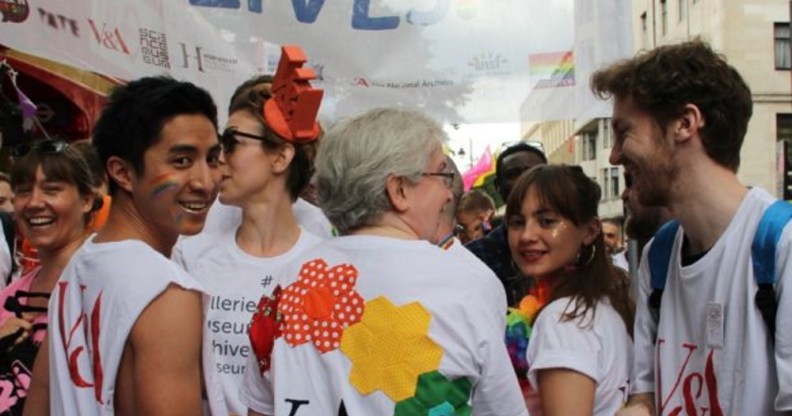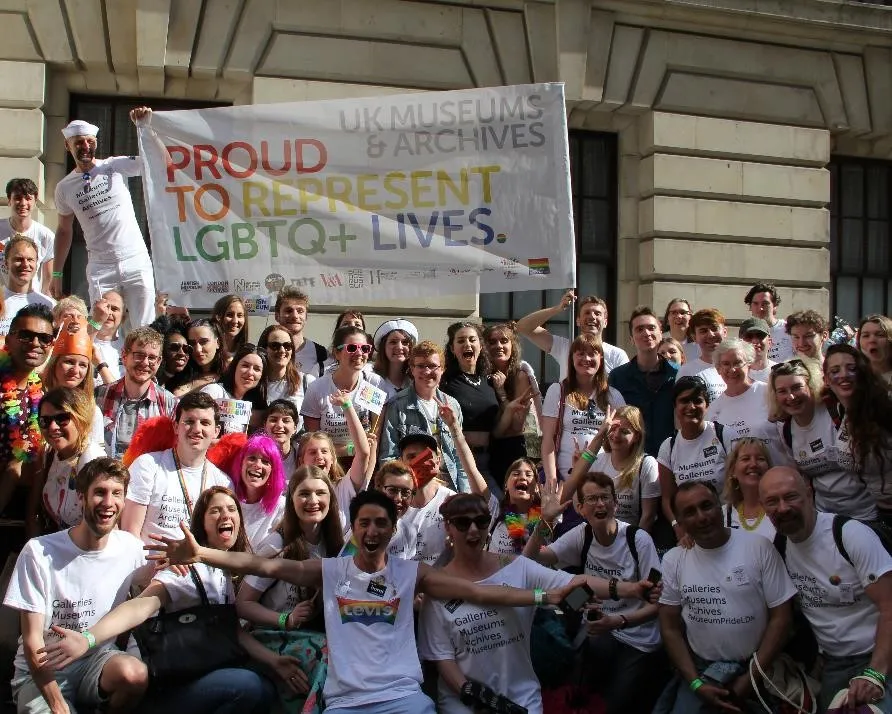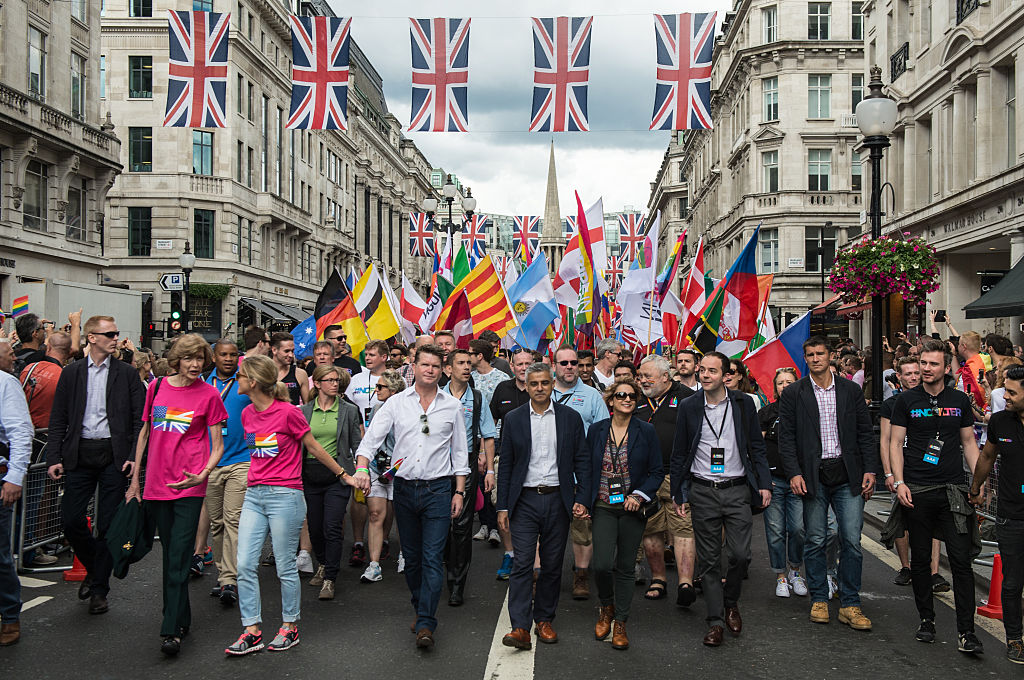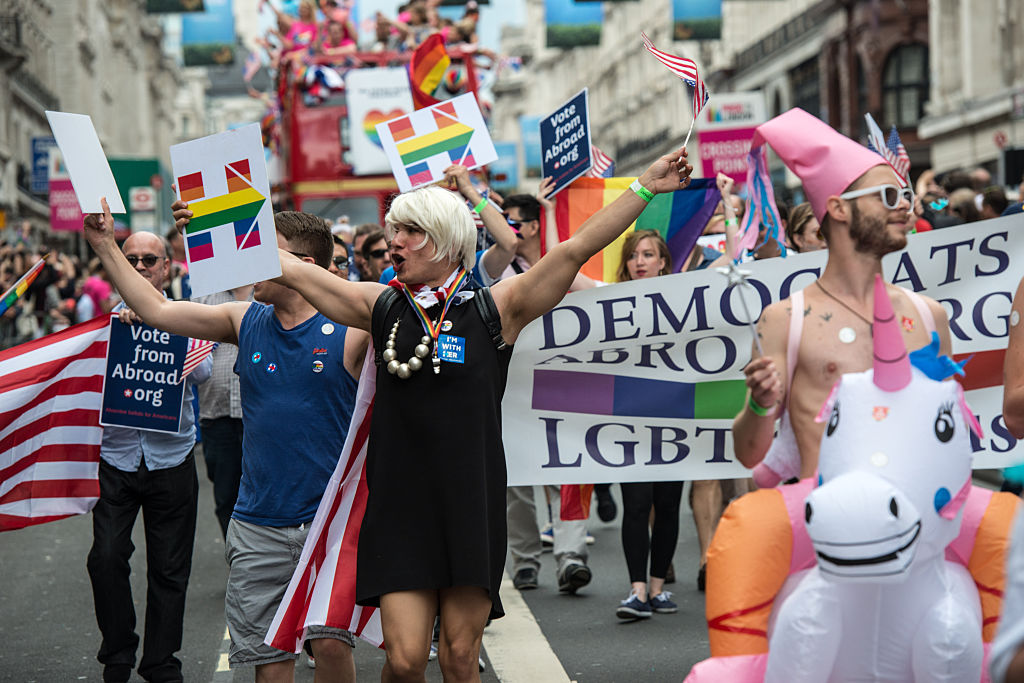Group including Tate Modern, British Museum and V&A prevented from marching in Pride in London parade

The Museum Association at Pride (V&A)
PinkNews Exclusive
A group which represents more than 900 museums and galleries including Tate, V&A and the British Museum has been prevented from marching in the Pride in London parade, PinkNews can reveal.
The Museum Association, which marched for the first time in the parade last year, said it was set to “nearly double” its numbers in this year’s event.
However, despite sending in its application well before the deadline, the organisation was told this week that the Pride parade was already full.
The news is especially significant because Tate Britain will be launching the Pride in London festival in June with a day-long celebration of the LGBT community called Queer And Now.
However, Tate Britain, which is a member of the Museums Association, will have a float in the parade thanks to a separate agreement with organisers made when it agreed to launch the festival.
Alistair Brown, policy officer for the Museums Association, told PinkNews the news was particularly tough to take after last year’s success, which he said was “a really big step for the museum sector”.
“We’re doing loads of great work around LGBT issues, and we were really keen to participate again this year, but it seems that even though we didn’t miss any deadline, by the time we submitted our application they were already full.

“We’re really hopeful we can still find a way to participate because we think it’s really important for museums to be seen as an important part of the community.”
Brown added while speaking to PinkNews that there was “a certain irony considering the opening party is at Tate, who were welcome to march under our banner.”
Sacha Coward, community participation producer at the National Maritime Museum in Greenwich, told PinkNews that the development was “very disappointing”.
“Last year we marched as a united museum sector for the first time at Pride in London. There were 150 of us representing 16 different museums, galleries and archives across London and the UK.
“We shone a spotlight on queer history and culture in all our institutions, allowing us to each make steps in revealing the stories and experiences of LGBTQ people in our collections.
“It was powerful, beautiful and important – exactly what Pride is all about.”
He said he and his team were “really taken aback to find we had been put on a waiting list – to be honest, it was very disappointing.

“As a non-profit group of individuals whose job is preserving and sharing queer heritage, we feel strongly that we embody the ethos of Pride in London.
“We understand that corporate sponsorship and floats are needed so that Pride can take place but we also feel strongly that the heart of Pride has always been about our community, shared culture and a celebration of diversity and inclusion.
“That’s what we are all about.”
MP Mike Freer, who has been heavily involved with Pride in London, defended the organisation, reasoning that it “only has a limited amount of space for the parade”.
“This year the spots were taken very quickly and those who applied later missed out,” he added.
“I understand that Pride are working with organisations which have taken a larger space to see if they can take less allowing those on the waiting list to be accommodated.
“Pride is more successful and in greater demand which is a good thing. They can’t be blamed if those quick of the mark beat others to the limited slots available.”
James Holt, Pride in London’s communications director, said the parade’s first come, first served system of allocating places was advertised from the beginning.

“We’ve always tried to be very clear,” he told PinkNews. “A number of groups have been caught out this time as we filled up quicker than normal.
“When the application process on our website opened, it stated that it was first come, first served, and said that while we anticipated the application process to remain open until April, it may have needed to close sooner if we were full.
“Last year’s parade was the largest we’d ever undertaken, and it continues to grow in popularity.
“After opening applications on January 8, the parade reached 100 percent capacity on March 16. Since that date more than 50 groups have asked to join the waiting list.”
Holt gave reassurances that the organisation, whose theme this year is Love Happens Here, was “trying various things to try and accommodate as many people as possible.
“Pride in London has this week started to ask larger groups with confirmed places if they would be prepared ‘donate’ some of their allocation to allow for more groups to take part.
“Amnesty, Unilever, Stonewall, Christians at Pride and West London Mental Health NHS Trust have been amongst the first groups to generously return some of their allocation in order to give other groups the opportunity to march.
“We are extremely grateful for their cooperation and support as we continue to work to try and make sure as many people as possible get to participate.”

